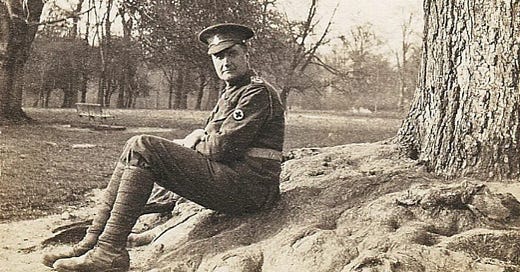Vaughan Williams Gets Angry, and We Get New Prince Tracks
RVW Listening Challenge and some lagniappe
Symphony No. 4 in F Minor
Last week, we listened to RVW's London Symphony, which is fairly cheerful and full of lyrical melodies. This week, we turn to his more violent side with Symphony No. 4 in F Minor. This is the first of his symphonies not to have a title, because, he claimed, it was pure music without any programmatic intention. The symphony's power, however, certainly seems to invoke the idea of war, even if he did not intend it. There are quiet moments, but the andante second movement is spooky rather than beautiful. This is one of only two RVW symphonies to end loudly. The other is the Eighth, which we listened to a couple of weeks ago in this post. Our recording for Symphony No. 4 is by the London Symphony Orchestra under the baton of Antonio Pappano.
Our second piece for the week provides some light-hearted relief: it is the orchestral suite taken from RVW's incidental music for The Wasps of Aristophanes. It's good fun, and I'm sure that you will enjoy it. Performing the suite is the Royal Liverpool Philharmonic, conducted by James Judd.
Here are links to our playlist on Apple Music and Spotify:
RVW Listening Challenge on Apple Music
RVW Listening Challenge on Spotify
Lagniappe: Two Newly Released Prince Tracks!
Over the last week, the Prince Estate dropped two surprises on us: two previously unreleased tracks from the Musicology era, circa 2004: "Magnificent," and "United States of Division." And they are both good!
Several subscribers have requested another Prince playlist, so I took this opportunity to put together this hour-long sequence, with the two new tracks leading off, and another series of (relatively) deep cuts from across his career. It includes the best ever recording of “Crimson and Clover” (apologies to Joan Jett fans), his best ever b-side (in my opinion) in “Pink Cashmere,” and an epic, 13-minute live version of “Forever in My Life.” I hope that you enjoy it. Fair warning: a couple of tracks get racy, but hey, it’s Prince. What did you expect? Burl Ives?
Here are links to the playlist on Apple Music and Spotify:
A Magnificent Prince Party on Apple Music
A Magnificent Prince Party on Spotify
I'll be back on Wednesday with week eight of The Lord of the Rings Reading Challenge, as we cover Book Five, Chapter 7 through Book Six, Chapter 4. And I haven’t forgotten my promise to provide another “Meet the Artist” feature; just let me put the spring semester to bed first.
Thanks for reading, from my fancy internet typewriter to yours.







The Prince playlist! So good! Thanks John.
The Overture and March of the Kitchen Utensils are on my playlist, but I had forgotten the rest of the suite, especially that first Entr'acte. Listening again made me reflect on how much of an influence Vaughan Williams had on British, and American, cinematic music. VW of course wrote film music himself, but often I will find myself thinking when watching a film, particularly from the '40s and ' 50s, about how V. Williams-esque the cadences are. I remembered VW's 4th Symphony as the most discordant. Listening this time, the first movement is dissonant, but it might also be the ominous soundtrack of a Film Noir psychological thriller. The symphony is moody, but VW's sense of humour breaks through in that last movement-Finale con epilog fugato: the dialogue between the angsty woodwinds and the down-to-earth brass, the intervals where the dissonance dissolves into jazz, the utter chaos of the fugue, and then, in a twist that made me laugh, that final resolving chord coming after the pause makes you think the previous series of dissonant chords was the end.
Prince's 'United States of Division' was really on the nose. Did producers hold it back in 2004 to avoid raising a political firestorm? 'Magnificent' had something of the sound of a demo with instrumental added, rather like Buddy Holly's posthumous releases. I like Holly's 'Learning the Game', but I can hear the join between his voice and the instrumental accompaniment. Prince's voice, which is a bit out of balance in volume with the accompaniment, sounds like it was recorded in a different setting or on different equipment than the instrumental.